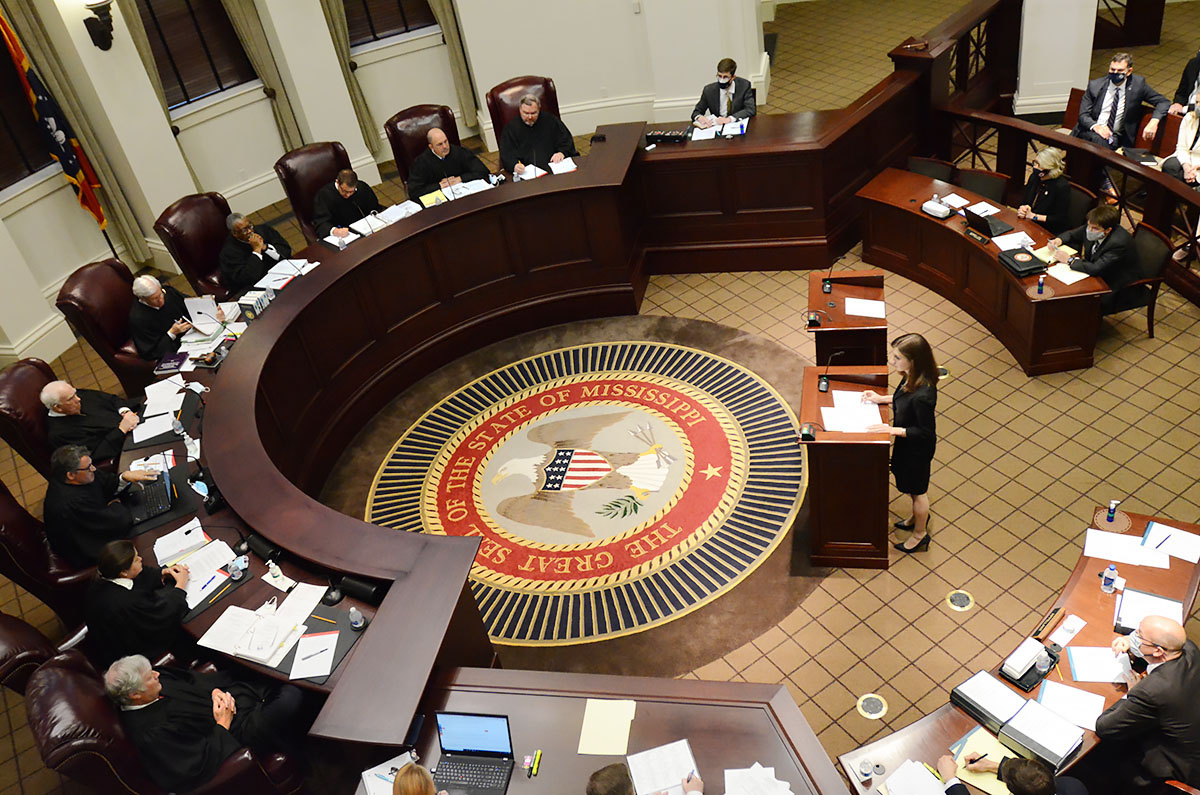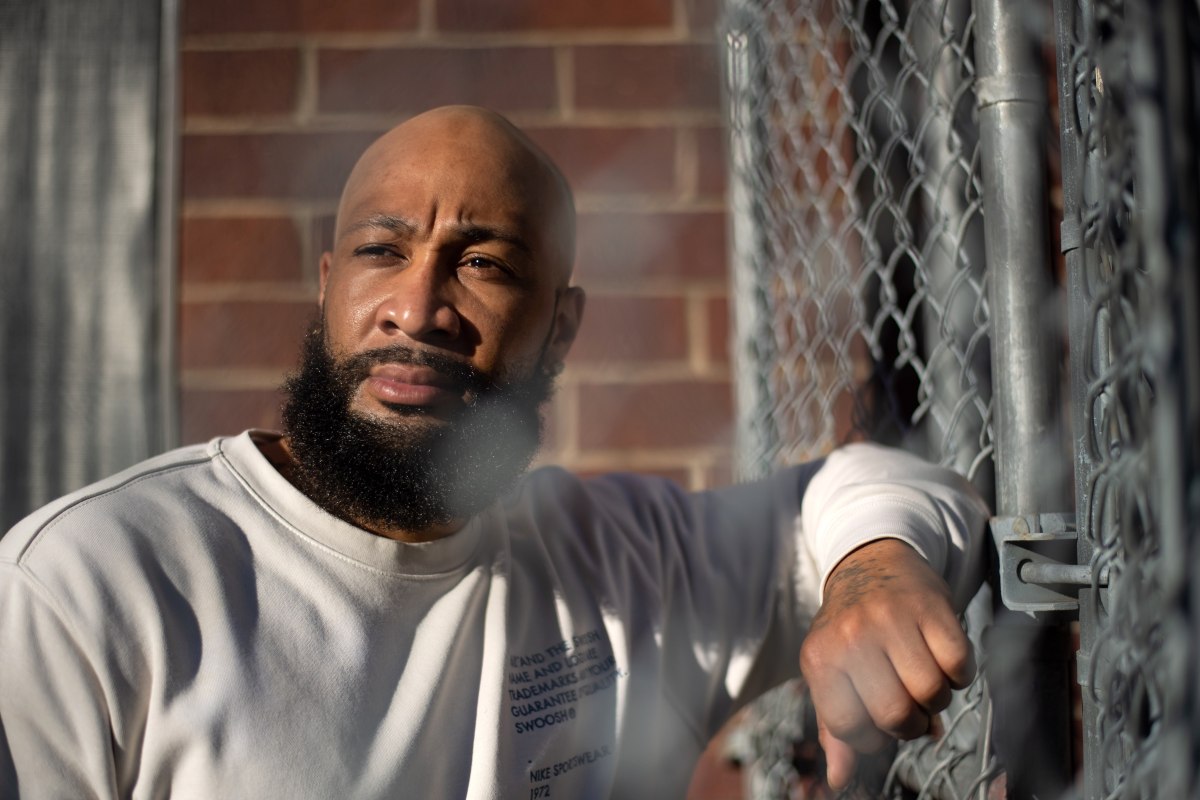Mississippi Today
Some are jailed in Mississippi for months without a lawyer. The state Supreme Court just barred that.

Some are jailed in Mississippi for months without a lawyer. The state Supreme Court just barred that.
This article was produced for ProPublica's Local Reporting Network in partnership with theNortheast Mississippi Daily Journaland co-published withThe Marshall Project.Sign up for Dispatchesto get stories like this one as soon as they are published.
Poor defendants in Mississippi are routinely jailed for months, and sometimes even years, without being appointed an attorney due to the state's notoriously dysfunctional public defender system. The Mississippi Supreme Court now says this practice must end.
The state's highest court approved a mandate on Thursday thatcriminal defendants who can't afford their own attorney must always have onebefore an indictment.
Across the state, defendants facing felony charges lose their appointed attorneys after their initial court appearances, where a judge rules whether they can be released from jail before trial. In many counties, defendants aren't appointed new lawyers until they're indicted, a process that can take years. Justice system reformers call this gap the “dead zone.”
In the Mississippi Delta's Coahoma County, Duane Lakespent almost two yearsbehind bars without bond and without an attorney while waiting to be indicted on triple murder charges following a brutal killing. After he was indicted, he spent four more years in jail before he was acquitted at trial in November 2021.
There are others like him, trapped in a system that leaves defendants who can't afford their own attorneys with no advocate to ask a judge to reduce their bonds or dismiss their cases as they wait in jail to be indicted. Meanwhile, prosecutors face no deadlines to bring cases before a grand jury.
“There is no other state where a defendant can be sitting in jail without an attorney for months or years while charging decisions are made,” said David Carroll, executive director of the Sixth Amendment Center, which studies how states provide indigent criminal defense.
Several years ago, at the request of a task force appointed by the Mississippi Legislature, the Sixth Amendment Center evaluated the state's indigent defense services. In ahighly critical report, the group proposed a number of reforms, including stronger state oversight of how local governments provide public defenders.
The Legislature shelved the report and the task force's recommendations, even as criminal justice reformersidentified defendantslike Lake who sat in jail for years facing charges that didn't hold up.
But in February, a three-member committee of the Mississippi Supreme Courtrequested public commentson a proposed change to the state's rules of criminal procedure. It would require that defendants who can't afford their own attorneys be represented the entire time they're awaiting indictment.
The Supreme Court approved therule changeThursday. It takes effect in July.
“This landmark change in Mississippi's public defense system marks the end of the dead zone and is a huge step toward a criminal legal system that doesn't unfairly punish people who are unable to afford an attorney,” said Cliff Johnson, who as director of the MacArthur Justice Center's Mississippi office has long argued for such a change.
But researchers like Pam Metzger, director of theDeason Criminal Justice Reform Centerat Southern Methodist University in Texas, say simply requiring the assignment of an attorney will do little to improve legal representation for poor defendants.
“It's giving you a warm body and briefcase,” she said of the rule. “But it doesn't deal with what in my view is the real problem,” which is that people spend too long in jail before they're indicted.
Current and former public defenders have also cautioned that Mississippi's decentralized justice system will make it hard to implement the Supreme Court's new rule.
The amended rule prevents an appointed attorney representing an indigent client at any stage of criminal proceedings from withdrawing until another attorney is appointed. Right now, this provision applies only after an indictment.
It wasproposedin May by Russ Latino, who was then executive director of the conservative think tank Empower Mississippi. His request sat for nearly 10 months until the Supreme Court's criminal procedure committee invited feedback and set a March 15 deadline for responses.
A raft of ideologically diverse legal activists, attorneys and policy advocates responded byurging the courtto adopt the amendment.
“No just or useful purpose is served by allowing such incarceration without benefit of legal counsel,” wrote Brad Pigott, who served in the 1990s as one of Mississippi's U.S. attorneys. “Certainly no legitimate law enforcement purpose is thereby served.”
‘We've Got People Languishing in Jail'
Across Mississippi, some people without attorneys have spent months or longer in jail waiting for an indictment.
After prisoners in eastern Mississippi's Lauderdale County jail filed complaints, a federal judge ordered the county in 2016 toprovide him with a list of all people held in jailwithout indictments and without lawyers.
“Something needs to be put in place to make sure someone doesn't fall through the cracks in this way,” said U.S. District Judge Carlton Reeves, according to an Associated Press story.
On the state's Gulf Coast, an autistic teenager was arrested in 2018 on burglary charges andspent more than 270 days in jailbecause his family didn't post a $10,000 bond. The charges were ultimately dropped after a grand jury declined to indict him.
The Wayne County Sheriff's Department, in southeast Mississippi's Pine Belt region, reported that 24 of 31 prisoners in the jail as of the end of September had not been indicted, including 13 who had been in jail 90 days or longer. Only six of these 13 had lawyers as of September, according to the report.
One person without a lawyer had been jailed for about six months awaiting indictment on a drug possession charge, according to the report.
Of those 13, only one is still in jail and hasn't been indicted as of this week, said Kassie Coleman, the district attorney for Wayne County.
Gregory J. Weber, a part-time public defender in Madison County, said he sees delays with many cases, particularly drug charges.
“We've got people languishing in jail and nothing is being done,” Weber said in an interview before the Supreme Court acted. For defendants with a private attorney, “something usually is done about it. There is a bond reduction, or they get into drug court and they plead. So we've definitely got a problem with people falling through the cracks.”
Lawyers Aren't Only Factor in Long Jail Stays
Even as Carroll, of the Sixth Amendment Center, called the change an important first step, he cautioned that because indigent defense is handled by local court systems, “the state still has no oversight function to make sure that the court rule gets implemented.”
The Sixth Amendment Center has found that in counties without full-time public defender's offices — which is most of them — the payment structure discourages public defenders from doing extensive work on behalf of their clients.
In most counties, attorneys are paid a flat fee, no matter how many indigent clients they are assigned. That incentivizes attorneys to spend little time on indigent clients so they can take on those who can pay, the center argued.
Nor does the new rule spell out how defendants will be transferred between appointed counsel working for different court systems and different local government bodies. “I think it needs to be delineated much more clearly about when the handoff occurs and who is responsible for that person,” Weber said.
But better payment structures and effective administrative procedures won't change a key factor in long jail terms: Prosecutors have unlimited time to indict and prosecute someone after they've been arrested.
“We're really focused in Mississippi on the charging time,” said Metzger, who has studied this phase of criminal proceedings in courts across the country.
She said it would be more effective to institute deadlines for indictment, mandatory bail hearings and early disclosure of evidence.
Even when lawyers are appointed early on, such as in Yazoo County, defendants still spend months or years in jail.
Defense attorneys in the county have filed almost 100 motions since 2019 seeking to reduce bonds or dismiss charges. Many of those defendants had spent a year or more in jail while waiting to be indicted.
John Paul Thornton was arrested by Yazoo City police on Dec. 3, 2018, and charged with two counts of commercial burglary involving a local dollar store. Over a year later, Thornton was still in jail and had not been indicted.
Belinda Stevens, an attorney who works part time as a public defender in Yazoo County, filed a motion on Thornton's behalf in January 2020, seeking a dismissal of the case and claiming that his constitutional right to a speedy trial had been denied. Stevens didn't respond to requests for comment.
A month later, prosecutors dropped the case. A judge signed an order, and Thornton walked free the next day after 436 days in jail.
This article first appeared on Mississippi Today and is republished here under a Creative Commons license.
Mississippi Today
On this day in 1896


MAY 18, 1896

The U.S. Supreme Court ruled 7-1 in Plessy v. Ferguson that racial segregation on railroads or similar public places was constitutional, forging the “separate but equal” doctrine that remained in place until 1954.
In his dissent that would foreshadow the ruling six decades later in Brown v. Board of Education, Justice John Marshall Harlan wrote that “separate but equal” rail cars were aimed at discriminating against Black Americans.
“In the view of the Constitution, in the eye of the law, there is in this country no superior, dominant, ruling class of citizens,” he wrote. “Our Constitution in color-blind and neither knows nor tolerates classes among citizens. In respect of civil rights, all citizens are equal before the law. The humblest is the peer of the most powerful. The law … takes no account of his surroundings or of his color when his civil rights as guaranteed by the supreme law of the land are involved.”
This article first appeared on Mississippi Today and is republished here under a Creative Commons license.
Did you miss our previous article…
https://www.biloxinewsevents.com/?p=359301
Mississippi Today
Renada Stovall, chemist and entrepreneur
Renada Stovall sat on the back deck of her rural Arkansas home one evening, contemplating life when she had a life-altering epiphany…
“I gotta get out of these woods.”
She heard it as clear as lips to her ear and as deep as the trees surrounding her property. Stovall's job as a chemist had taken her all over the country. In addition to Arkansas, there were stints in Atlanta, Dallas and Reno. But she was missing home, her parents and friends. She also knew, she needed something else to do.
“I thought, what kind of business can I start for myself,” said Stovall, as she watered herbs growing in a garden behind her south Jackson home. Some of those herbs are used in her all-natural products. “I know when I lived in Reno, Nevada, where it's very hot and very dry, there really weren't products available that worked for me, my hair, and my skin suffered. I've got a chemistry degree from Spelman College. I took the plunge and decided to create products for myself.”

In 2018, Stovall's venture led to the creation of shea butter moisturizers and natural soaps. But she didn't stop there, and in December 2022, she moved home to Mississippi and got to work, expanding her product line to include body balms and butters, and shampoos infused with avocado and palm, mango butter, coconut and olive oils.
Nadabutter, which incorporates Renada's name, came to fruition.

Stovall sells her balms and moisturizers at what she calls, “pop-up markets,” across the state during the summer. She's available via social media and also creates products depending on what of her ingredients a customer chooses. “My turmeric and honey is really popular,” Stovall added.
“The all-natural ingredients I use are great for conditioning the skin and hair. All of my products make you feel soft and luscious. The shea butter I use comes from West Africa. It's my way of networking and supporting other women. And it's my wish that other women can be inspired to be self-sufficient in starting their own businesses.”





This article first appeared on Mississippi Today and is republished here under a Creative Commons license.
Mississippi Today
On this day in 1954
MAY 17, 1954

In Brown v. Board of Education and Bolling v. Sharpe, the U.S. Supreme Court unanimously ruled that the “separate but equal” doctrine in Plessy v. Ferguson was unconstitutional under the 14th Amendment, which guaranteed equal treatment under the law.
The historic decision brought an end to federal tolerance of racial segregation, ruling in the case of student Linda Brown, who was denied admission to her local elementary school in Topeka, Kansas, because of the color of her skin.
In Mississippi, segregationist leaders called the day “Black Monday” and took up the charge of the just-created white Citizens' Council to preserve racial segregation at all costs.
This article first appeared on Mississippi Today and is republished here under a Creative Commons license.
-
SuperTalk FM6 days ago
Martin Lawrence making 3 stops in Mississippi on comedy tour
-
Our Mississippi Home5 days ago
Beat the Heat with Mississippi’s Best Waterparks
-
SuperTalk FM2 days ago
State auditor cracking down on Mississippians receiving unemployment benefits
-
Our Mississippi Home6 days ago
Charlie’s U-Pik: Opening Soon for the Summer Season
-
Mississippi News Video4 days ago
Jackson has a gang problem
-
Kaiser Health News5 days ago
Medicaid ‘Unwinding’ Decried as Biased Against Disabled People
-
228Sports4 days ago
George County Pours Runs In 6A South State Title Victory At PRC
-
Local News1 day ago
Family files lawsuit after teen’s suicide in Harrison County Jail










































